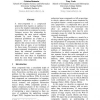Free Online Productivity Tools
i2Speak
i2Symbol
i2OCR
iTex2Img
iWeb2Print
iWeb2Shot
i2Type
iPdf2Split
iPdf2Merge
i2Bopomofo
i2Arabic
i2Style
i2Image
i2PDF
iLatex2Rtf
Sci2ools
COLING
2008
2008
A Concept-Centered Approach to Noun-Compound Interpretation
A noun-compound is a compressed proposition that requires an audience to recover the implicit relationship between two concepts that are expressed as nouns. Listeners recover this relationship by considering the most typical relations afforded by each concept. These relational possibilities are evident at a linguistic level in the syntagmatic patterns that connect nouns to the verbal actions that act upon, or are facilitated by, these nouns. We present a model of noun-compound interpretation that first learns the relational possibilities for individual nouns from corpora, and which then uses these to hypothesize about the most likely relationship that underpins a noun compound.
COLING 2008 | Compressed Proposition | Computational Linguistics | Implicit Relationship | Relational Possibilities |
| Added | 29 Oct 2010 |
| Updated | 29 Oct 2010 |
| Type | Conference |
| Year | 2008 |
| Where | COLING |
| Authors | Cristina Butnariu, Tony Veale |
Comments (0)

